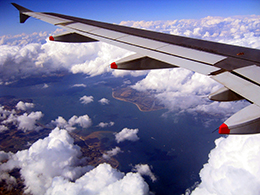21 April 2016
 Just how significant human error is in contributing to aviation accidents can be gleaned from a simple statistic: in 80 per cent of all accidents the captain was at the controls.
Just how significant human error is in contributing to aviation accidents can be gleaned from a simple statistic: in 80 per cent of all accidents the captain was at the controls.
It’s a percentage that Dr Douglas Drury, Discipline Leader, Aviation, at UniSA’s School of Engineering, mentions, ahead of a presentation he will deliver at a Royal Aeronautical Society (Adelaide branch) event later this month on: Human Factors in Aviation.
With more than 30 years’ experience flying military, commercial, private charter, and emergency medical operations, it’s a subject that Dr Drury knows inside out.
In 1990 Dr Drury was a reserve pilot on a flight where he was advised that the captain could “get funny” flying through clouds. The story of that flight, written as the preface to Dr Drury’s thesis: Critical Flight into Emotional Terrain reads like a synopsis of a disaster movie, while underlining the importance of emotional regulation in the skies.
When the captain of that flight suddenly froze at the controls of an aircraft as it descended through cloud to land, a rollercoaster journey began in the skies, leaving passengers terrified and leading Dr Drury to record a “final message” to his wife on the aircraft’s cockpit voice recorder because he thought they wouldn’t make it. Fortunately his response to that situation helped avert catastrophe.
Pilot failure, not instrument failure, was the cause of what Dr Drury describes as the “flight from hell”, prompting him, decades later, to research the role of emotions on the flight deck, a thesis aimed at developing greater industry awareness of the issues and promoting more research into the development of emotion-regulating skills for crew members.
At UniSA, Dr Drury is responsible for the development of pilots and aviation professionals, and he believes aviation human factors training has come a long way.
“It used to be ‘this is my flight deck. Flaps up, gear up, shut up,” Dr Drury says
“The training now focuses on promoting good situational awareness of the team and openly challenging irregularities.
“We are also seeing more interest in understanding events like the Germanwings airline crash. The first officer (Andreas Lubitz) had a documented history that was never properly vetted before he was cleared to fly.
“Another recent example was an Italian pilot who had sent his wife a text message telling her that he was going to crash an airplane with 200 passengers on board if she left him. The pilot was detained by police before he arrived at the gate.
“Emotional instability is not a topic that is freely discussed in aviation. To quote Tom Hanks in A League of Their Own, ‘there’s no crying in baseball’.”
Dr Drury says it is human nature to defer to a higher authority under duress and that while flight captains are burdened by the task of solving and possibly salvaging an emergency situation, their training doesn’t focus on understanding the cognitive processes of attention and decision making under stress.
It’s a subject that also relates to other professions where stressful decisions need to be made, which may have significant impact or repercussion.
“Our police officers are put into situations that require decisions to be made during highly emotive moments,” Dr Drury says.
“Our military forces are placed in situations of prolonged stress that require multiple decisions to be made on the spot. Our first responders are exposed to situations that require full focus during extreme stress. More work needs to be done to develop more emotional awareness within ourselves and those we are working with in high-risk environments.”
Human Factors In Aviation will be presented at 6pm on April 26 at UniSA’s Mawson Lakes campus (Building MM1-05, University Boulevard). To register to attend, click here.
Contact for interviews:
Dr Douglas Drury +61 8 830 23945 email Doug.Drury@unisa.edu.au
Media contact: Will Venn office +61 8830 20096 mob 0401366054 email will.venn@unisa.edu.au


